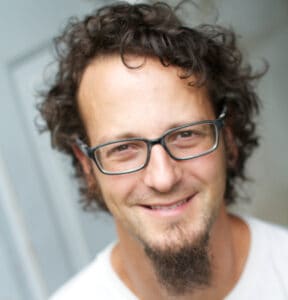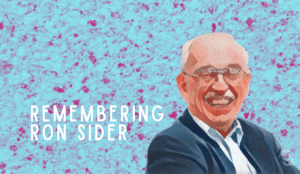 Originally published Nov 22, 2022
Originally published Nov 22, 2022
I first met Ron at Eastern Univeristy—he was at the seminary and I was fresh out of the East Tennessee Bible belt. I arrived at Eastern with a very open mind, but new to connecting my faith to the bigger social issues and questions of how to address poverty. Ron was speaking in chapel that morning. He was very smart, so initially he was a little academically intimidating. But that is part of what I loved about him. Part of what everyone loved about Ron was he really lived out the command to “love God with all of your mind.” He did the other parts, too, but to see someone who was correcting bad theology with really good theology, and who was so smart in devoting all of that energy, wisdom, and knowledge towards Jesus and the purposes of Christ—that was wonderful.
Ron prayed in the name of the God of the oppressed. There was an authenticity, intimacy, and love for Jesus, but also this appreciation of Jesus’ heart for those who have been marginalized ingrained in everything he said. Ron’s whole talk was about how fundamental to our faith is caring for those who are in poverty.
I got to know Ron a lot better as we were starting the Simple Way and forming advisory boards. Ron said, “Is this centered around Jesus? Because I want it to be really centered around Jesus, or I’m not sure I have quite as much to offer.” As we began drafting a statement of our fundamental beliefs, practices, and theology, Ron’s admonition to keep Jesus at the center of everything was something I kept revisiting in my mind. Now for over 20 years we have been doing that work in the Simple Way. Even in my personal life to stay grounded in my love for Jesus is what fuels all the other work that we do.
A lot of our formation at the Simple Way was protesting bad laws, confronting principalities and powers, and doing direct action and civil disobedience. There was a sense of our kingdom is not of this world, and how much is politics really going to change things? And that’s where I started to see another part of Ron’s work, which was engaging the powers that be without losing your soul. We invited him to lead a discussion with a pretty broad group of people. It wasn’t a huge group (only about as many as we could fit in our living room), and probably a number of folks hadn’t voted before. In some ways we were inviting Ron to challenge us to see how voting does make a difference, and how you can vote for someone like a commander-in-chief of the biggest military of the world and not compromise your faith. Part of why we invited Ron to do that was because he was concerned about his faith and innocent as a dove as he engaged the powers.
Out of conversations like that our work around Jesus for President took shape. That started as a discussion and book club. There was a growing curve—the idea that we are working out our salvation with fear and trembling. Being in Philadelphia, we heard about the Jubilee Fellowship and heard all kinds of stories about communal life. And what is most significant about that is you feel like we’re not doing something brand new. We are standing on the shoulders of folks who have done this before. It is not easy to do community life. We sort of say community would be so easy if it weren’t for the people. Ron and Arbutus had highs and lows and shared even those raw stories. That was so helpful for us, because you have days where all the romanticism is gone.
As much as I love my neighborhood, it is really hard sometimes. Ron never sugarcoated or tried to brush over those rough edges of the truth about community life, which was going deeper into a life with Christ. My love and appreciation for Ron started with the academics, but then I started to see a “dying to self” in him that was so informative on all levels—my brain, my heart, the everyday nitty gritty of how to get the dishes done when living with 10 people.
Ron stood firmly in that space that is grounded in Jesus. And because it is grounded in Jesus, our faith is concerned about the injustices of the world. And that does not sound like it should be exceptional, but everywhere I went people were upset about something Ron said. It is such a compliment, how broad the critique was—you had folks that said that Ron was too conservative and others who said Ron was too liberal. You could always be sure that Ron was not hiding his heartfelt convictions.
Truth can cut a little bit. There was a meeting where Ron was talking about how important it is to protect your marriage and uphold fidelity of marriage. And there were folks in the room who were getting a divorce or considering getting a divorce that I knew about that he probably did not know. There were lots of different ways that people heard that, but when I stepped back, it was a simple admonition. In terms of sexuality and same-gender relationships—there were things that we may not have seen eye to eye on and certainly other people in the room did not. But with Ron there was always gentleness, openness, and a real groundedness that encouraged me to be confident about the things that I know, and to be honest about the things that I do not know.
When I look at the church, it seems that there is a pattern of over-correcting some of the things we’ve neglected. When the right wheels of our car run off the road, we yank the steering wheel and run off the other side of the road. So we can end up exaggerating one truth that we have neglected at the expense of not emphasizing something else or forgetting another truth. Ron spoke so powerfully about those binaries—that we separate faith from works, the great commission from social justice, but in fact these are two blades of scissors that have to operate together, and that is so important. I’m in circles of folks who love Jesus but don’t talk about justice, and folks who love justice but really don’t have as much to do with Jesus. In fact, sometimes you can almost predict the more people are ringing the Jesus drum the less they care about justice. Ron was a steady, consistent refrain and solid example that we cannot separate these things that belong together—Jesus and justice. Like the blades of scissors, they do not work well separated from each other. Ron would say, “People need Jesus and a job, right?” He said that in a million different ways.
For us to continue to press into Ron’s legacy, here are two things to remember:
- Ron’s love for the early church—the innocence of their witness, consistent ethic of life, passion for community, and their radical economy of love that meant they held their possessions so openly.
- What does it mean to have a consistent ethic of life? Ron would say, “from womb to tomb.” Comprehensive of all issues, are we valuing all life? Not picking one issue and being pro-life on it but then failing to champion for life on another. In some ways this is a critique of the anti-abortion movement that ignores many other issues, but also is a challenge for folks who on the left care about poverty, but haven’t necessarily extended that to think about how can we do a better job of protecting the life of young mothers who are in tough situations and unborn children.
Ron lived it out beyond his books and ideas, too. He pretty much wore the same jacket every time I saw him. And to me that didn’t feel old fashioned—it felt wonderful. Franciscans don’t change outfits much, nuns don’t change outfits much. In his writing and speaking he was wonderfully poetic and beautiful with words, but there was also a simplicity about it that allowed you to really receive it. That has impacted hundreds of thousands of lives, because the focus is on our heart and the message. There are a lot of academics who have platforms but you can’t call them up and say, “Could you pray for me?” I always felt like I could do that with Ron. Sometimes it was even just a simple question that I wanted to get a source on or a little bit more to read about. He was always quick to respond. I want to be like that.
 Shane Claiborne is a prominent speaker, activist, and best-selling author. Shane worked with Mother Teresa in Calcutta and founded The Simple Way in Philadelphia. He heads up Red Letter Christians, a movement of folks who are committed to living “as if Jesus meant the things he said.”
Shane Claiborne is a prominent speaker, activist, and best-selling author. Shane worked with Mother Teresa in Calcutta and founded The Simple Way in Philadelphia. He heads up Red Letter Christians, a movement of folks who are committed to living “as if Jesus meant the things he said.”


